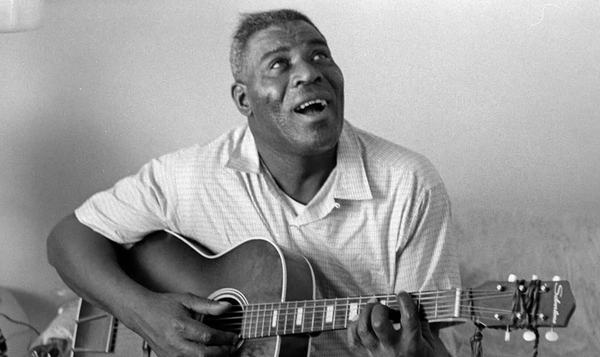Born Chester Burnett in June 1910, Howlin’ Wolf’s family were sharecroppers and poor with it. His mother was devoutly religious, but his parents separated when he was young. Through his mother, the young Wolf learned to sing in the church, but after having been thrown out of the maternal home whilst still a child, worked on the farm of his great uncle, Will Young. His tenure there was an unhappy one; he received little schooling, leaving him functionally illiterate until he was in late adulthood. The final straw came when an enraged Wolf killed one of his great uncle’s hogs, and he was whipped off the farm. According to legend, he then walked eighty-five miles barefoot to join up again with his father’s family.
As time wore on, Wolf grew to the height of six foot three inches – a bear of a bloke – and, around 1930, met and befriended the great Delta Bluesman Charley Patton. From Patton he learned the rudiments of guitar, and also how to put on a show, Patton pulling such tricks as playing the guitar behind his head, throwing the guitar up in the air mid-song, playing it between his legs. He also picked up harmonica skills from Sonny Boy Williamson II, with whom he hooked up when he moved to Parkin, Arkansas, in 1933. Wolf also admired the original ‘Blue Yodel’ of the singer Jimmie Rodgers, but mimicking the yodel was not within his grasp – it came out more like a howl, hence his stage name.
As the thirties progressed, Howlin’ Wolf became a popular performer at Juke Joints and bars on what became known as the ‘chitlin circuit’ in the Southern States of the USA. After a stint in the army, Wolf returned to the family farm in 1943, and also resumed performing, forming a band in 1948. By 1951, Wolf came to the attention of Ike Turner, then a freelance talent scout working in the West Memphis area, who in turn brought him to the attention of Sam Phillips, then running a set up called the Memphis Recording Service, although he would shortly instigate the legendary Sun Records label. Wolf would end up recording for Phillips, and the Bihari Brothers at Modern Records. Of greater import was his signing to the Chess Records label in Chicago in 1952. It was for the label that Wolf would cut his definitive recordings, slabs of wax that would go on to form some of the basis for many American and British rhythm and blues in the sixties.
Wolf was supplied with great songs by the ubiquitous and hugely creative Willie Dixon. Dixon was a prolific writer, simultaneously penning songs for Wolf’s great Chess rival, Muddy Waters. When Muddy had a hit with a Dixon song, Wolf would get on Dixon’s case about why he didn’t give it to him. Eventually, Dixon figured out that, if he told Wolf that he was going to offer a song to Muddy, Wolf would want to get in and cut it first. Not that Wolf couldn’t pen a tune; indeed, his original ‘Smokestack Lightning’ was another song that would become a staple of many a combo, and his ‘Killing Floor’ was a favourite of Jimi Hendrix, no less, as well as being a barnstorming fixture of the live set of Albert King (who, along with BB King and Freddie King, was one of the ‘Three Kings of the Blues’, of course).
Wolf was also one of the first of the great post-war Bluesmen to tour in Europe, being part of the first American Folk Blues Festival, which toured in 1964, which was not only preserved on film for German TV, but gave an auspicious opportunity for British and European Blues fans to see their heroes in the flesh. His influence expanded still more as the sixties played out. The Rolling Stones had their second UK number one with a version of Wolf’s ‘Little Red Rooster’ (written by Willie Dixon) and Jeff Beck recorded Wolf’s ‘I Ain’t Superstitious’ on his magnificent Truth album of 1967, which featured Rod Stewart on lead vocals and future Faces/ Rolling Stone Ronnie Wood on bass.
Howlin’ Wolf passed away in January 1976, the result of complications following kidney surgery. He was aged sixty-five. His astute management of his finances ensured that his family were comfortably off and his musical legacy continues to exert a profound influence on his blues-purveying descendants.
With thanks to Alan Robinson

